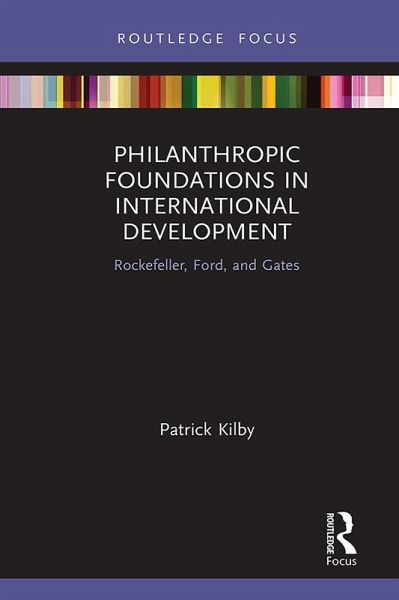
Philanthropic Foundations in International Development (eBook, ePUB)
Rockefeller, Ford and Gates
Versandkostenfrei!
Sofort per Download lieferbar
19,95 €
inkl. MwSt.
Weitere Ausgaben:

PAYBACK Punkte
10 °P sammeln!
This book focuses on the influence of philanthropic foundations in global development, and on how the global south has engaged with them.The idea of corporate philanthropy stretches back a long way, with the late 19th industrialist Andrew Carnegie seeing it as an important obligation of the very wealthy. In the modern day, Bill Gates has taken up this call, suggesting that the very wealthy should donate half their wealth to philanthropic causes, and endowing his own foundation with something in the order of $50 billion. This book brings together case studies of the most influential of these fo...
This book focuses on the influence of philanthropic foundations in global development, and on how the global south has engaged with them.
The idea of corporate philanthropy stretches back a long way, with the late 19th industrialist Andrew Carnegie seeing it as an important obligation of the very wealthy. In the modern day, Bill Gates has taken up this call, suggesting that the very wealthy should donate half their wealth to philanthropic causes, and endowing his own foundation with something in the order of $50 billion. This book brings together case studies of the most influential of these foundations over the last one hundred years: the Rockefeller, Ford, and Gates' Foundations, investigating their impact on education and research, health and agriculture. The book concludes by asking whether global south foundations such as Al Waleed Philanthropies, Tata Trusts, and those from China may point to the future of global philanthropic foundations.
The sheer scale of resources that foundations can devote to their work results in significant influence in global politics, to the point that Foundations can drive and even set government policy. This influence is likely to grow in the post-Covid environment, making this book an important resource for researchers, practitioners and policy makers working on global development.
The idea of corporate philanthropy stretches back a long way, with the late 19th industrialist Andrew Carnegie seeing it as an important obligation of the very wealthy. In the modern day, Bill Gates has taken up this call, suggesting that the very wealthy should donate half their wealth to philanthropic causes, and endowing his own foundation with something in the order of $50 billion. This book brings together case studies of the most influential of these foundations over the last one hundred years: the Rockefeller, Ford, and Gates' Foundations, investigating their impact on education and research, health and agriculture. The book concludes by asking whether global south foundations such as Al Waleed Philanthropies, Tata Trusts, and those from China may point to the future of global philanthropic foundations.
The sheer scale of resources that foundations can devote to their work results in significant influence in global politics, to the point that Foundations can drive and even set government policy. This influence is likely to grow in the post-Covid environment, making this book an important resource for researchers, practitioners and policy makers working on global development.
Dieser Download kann aus rechtlichen Gründen nur mit Rechnungsadresse in A, B, BG, CY, CZ, D, DK, EW, E, FIN, F, GR, HR, H, IRL, I, LT, L, LR, M, NL, PL, P, R, S, SLO, SK ausgeliefert werden.













